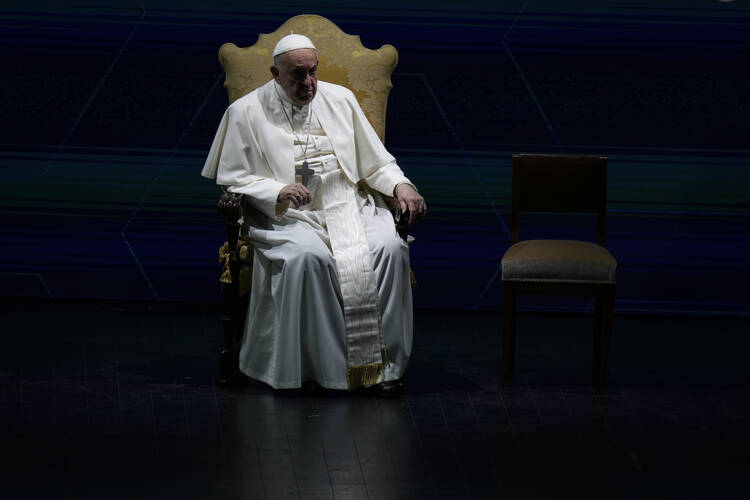A day after news broke that Pope Francis had allegedly used a derogatory word in a private conversation with Italian bishops about gay men applying to Italian seminaries, the Vatican has issued an official response.
“Pope Francis never intended to offend or to express himself in homophobic terms, and he apologizes to those who felt offended by the use of a word, referred [to] by others,” the Vatican said in a statement issued this afternoon, May 28.
The statement from Matteo Bruni, the director of the Holy See Press Office, came in response to questions from journalists regarding the pope’s use of the word “frociaggine,” an offensive word that, according to Italian media, Francis had used in a discussion about homosexuals in seminaries at his closed-door meeting with the Italian bishops’ conference on May 20. His usage of the slur caused an uproar in the media and L.G.B.T. groups.
“Pope Francis is aware of recent articles [in the media] about a conversation, behind closed doors, [that he had] with the Italian Bishops Conference,” the statement read. It notably says the word was “referred [to] by others.” America has learned from informed sources who wish to remain anonymous that Francis repeated the word that had been used by one or more bishops during the 90-minute question-and-answer session with the Italian bishops in the Vatican’s old synod hall.
Something similar happened earlier this year when Francis was interviewed by a journalist for Swiss media. The interviewer then asked whether Ukraine should raise “the white flag,” and Francis repeated the words “white flag” in his response. That statement gave rise to much controversy, with many in the media claiming that the pope was suggesting that Ukraine surrender. In reality, the pope was encouraging Ukrainians to seek a negotiated resolution to the war.
In today’s statement, Mr. Bruni said: “As [the pope] has had the opportunity to state on several occasions, ‘In the Church there is room for everyone, for everyone! No one is useless, no one is superfluous, there is room for everyone. Just as we are, everyone.’”
The statement notes that Francis’ use of “frociaggine” was not meant to offend as a slur. After all, this is the pope who in July 2013 responded “Who am I to judge?” when asked about a priest alleged to be gay.
As reported yesterday in America, the question regarding homosexuality and seminarians has been in discussion for some time by the Italian bishops’ conference, and according to the Italian newspaper Il Corriere della Sera, at their meeting in Assisi last November, they “had approved a new document ‘Ratio Formationis Sacerdotalis,’ not yet approved by the Holy See, regulating admission to and formation in [Italian] seminaries, in which they approved by majority vote an amendment that recognized the distinction between simple homosexual orientation and ‘deeply rooted tendencies.’”
This, the paper reported, meant “in substance, that a homosexual person could be admitted to the seminary if, like the heterosexual, he gave the guarantee that he knows how to live the discipline of celibacy. The implication is that it is more difficult for homosexuals because they will be living in an all-male community for many years.” But, the paper observed, “it seems that Pope Francis has a more radical vision: to avoid problems of this kind, homosexual persons should not be admitted to the seminary. Full stop!”
Some in Rome are now saying that the question regarding homosexuality and seminarians put to the pope may have come from one of those bishops who did not agree with the decision made by the Italian bishops’ conference by majority vote at the Assisi meeting.
Pope Francis’ stance echoes the official position of the Vatican held since 2005 when the Congregation for Catholic Education, with the approval of Pope Benedict XVI, issued a document on the question, titled “Instruction Concerning the Criteria for the Discernment of Vocations with regard to Persons with Homosexual Tendencies in view of their Admission to the Seminary and to Holy Orders.”
It states:
[T]his Dicastery, in accord with the Congregation for Divine Worship and the Discipline of the Sacraments, believes it necessary to state clearly that the Church, while profoundly respecting the persons in question, cannot admit to the seminary or to holy orders those who practice homosexuality, present deep-seated homosexual tendencies or support the so-called “gay culture.”
During a similar closed-door meeting with Italian bishops in 2018, La Repubblica reported, the pope told them if they had “even the slightest doubt” about a gay candidate being able to live a life of celibacy in the seminary and as a priest, “it is better not to let them in.”
In a book-length interview in 2018, Pope Francis said superiors must be able to help gay candidates prepare for a life of celibacy or encourage them to leave the seminary.
“Homosexuality is a very serious matter, which must be discerned adequately from the beginning with candidates, if it is the case. We must be demanding,” the pope had told Claretian Father Fernando Prado in the book interview, The Strength of Vocation: Consecrated Life Today.
Pope Francis made it clear in the interview that he was talking about homosexual activity among priests and religious who make vows of chastity and celibacy.
“In consecrated life or that of the priesthood, there is no place for this type of affection,” the pope said. “For that reason, the church recommends that persons with this deep-seated tendency not be accepted for ministry or consecrated life.”
Material from Catholic News Service was used in this report.








